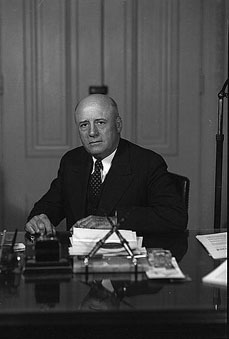Congress Taps Forgotten Power
Rep. Barney Frank has become a key point man in negotiating a Wall Street bailout.
Jul 31, 20204.9K Shares824.9K Views
Rep. Barney Frank (D-Mass.), Chairman of House Financial Services Committee (WDCpix)
Rep. Barney Frank (D-Mass.), chairman of the House Financial Services Committee, looks like a giant these days. As the financial markets have plummeted and President George W. Bush is proposing sweeping legislation to bail out Wall Street, Frank is a key point man, attempting to strike a delicate balance between the concerns of his congressional colleagues and the administration. He is trying to play the role of the legislative broker — a role that seemed to have vanished in the modern Congress.
His partner in this effort, Sen. Christopher Dodd (D-Conn.), chairman of the Senate Banking Committee, is also emerging from this crisis looking like a strong leader. Dodd, who performed horribly in the Democratic primaries, offered up a concrete outline for how the administration can revise the legislation so that it can pass Congress.
Illustration by: Matt Mahurin
Frank and Dodd are reminding Americans that Congress can exert tremendous amount of power. It has not always been seen as the “broken branch” of government, as Thomas Mann and Norman Ornstein now describe the current state of the institution.
Frank and Dodd are tapping into a legislative tradition that existed in the committee-era of Congress from the 1920s to 1970s, when senior committee leaders — mostly Southern Democrats and Midwestern Republicans — formed an alliance to shape public policy from the House and Senate.
This was a remarkable period in the history of Congress. Most of the legislative process took place behind closed doors. Bipartisanship was typical, and committee chairmen relied on orderly rules and norms that provided them with autonomy from the party leadership. Rank-and-file members were seen but had little influence.
The Senate had its share of warriors. One giant from the committee era was Sen. Arthur Vandenberg, Republican of Michigan, who chaired the Senate Foreign Relations Committee from 1947 to 1949. Vandenberg was a former isolationist who turned internationalist as a result of World War II.
Image has not been found. URL: /wp-content/uploads/2008/09/dodd.jpgSen. Christopher Dodd (D-Conn.), Chairman of the Senate Banking Committee (WDCpix)
Much of the GOP remained firmly opposed to President Harry S. Truman’s multilateral, European-based strategy in the Cold War. They wanted to emphasize anti-communism at home and fighting Communist Asia abroad. But Vandenberg, who developed a close partnership with the Truman administration, was critical in rounding up votes for landmark measures like the Truman Doctrine, the Marshall Plan and the establishment of NATO.
Sen. Lyndon B. Johnson of Texas was another baron of the Senate. As majority leader from 1954 to 1960, Johnson worked in an institution where majority leaders had traditionally been weak. He discovered and manipulated mechanisms like unanimous consent agreements — where individual members essentially agreed to relinquish their right to filibuster — to centralize authority in an institution that was notoriously individualistic.
Johnson used “The Treatment” — he confronted colleagues, hovered over them, and questioned them relentlessly in the hallway until they agreed to support him. Johnson displayed his skills in 1957, as Robert Caro has vividly recounted, when he brokered deals and formed odd voting coalitions to pass the first civil-rights bill since Reconstruction.
Senators have also been able to focus public attention on the failures of administration policy. During the 1960s, Arkansas Sen. William Fulbright, a liberal internationalist who had become disillusioned with Johnson, became a strong opponent of the war in Vietnam — after he pushed the Gulf of Tonkin Resolution on the Senate floor in 1964.
Fulbright chaired Senate Foreign Relations Committee hearings in 1966 that stung the Johnson administration. He dragged administration officials before TV cameras and grilled them about the conduct of the war and the broader strategy of containment. Fulbright biographer Randall Bennett Woods explained “the February hearings, in short, opened a psychological door for the great American middle class . . . if the administration intended to wage the war in Vietnam from the political center in America, the 1966 hearings were indeed a blow to that effort.”
Former Speaker of the House Sam Rayburn (National Archives)
The House has had its barons as well. Speaker of the House Sam Rayburn of Texas, who ran the House for most of the 1940s and 1950s, was a master at persuasion. He served as speaker in an era when committee chairs held enormous independent power, so he depended on negotiation and deliberation to get things done.
One of Rayburn’s central tactics was the “Board of Education,” a former committee room tucked away under the speaker’s lobby , where Rayburn met with his inner circle of Democrats to discuss the main issues of the day. Though he was physically small and unassuming, Rayburn commanded enormous respect by relying on informal relationships to influence decisions. While drinking bourbon and playing cards on the long leather couch and eight chairs that filled the room, Democrats debated the nation’s biggest issues.
Before his famous dip with a stripper in the Tidal Basin in 1974, Rep. Wilbur D. Mills of Arkansas, chairman of the House Ways and Means Committee, was one of the most influential figures in Washington. Mills commanded enormous power through his mastery of the tax code and Social Security system. He also made institutional changes, like blocking the creation of Ways and Means subcommittees, to retain his power.
In 1965, Mills seized the initiative from Johnson’s administration by taking the Medicare proposal, combining it with Republican and AMA-backed alternatives, and creating a program often called “the Mills bill.” When he combined the legislation, one committee member recalled that “it was fantastic. It was Wilbur Mills at his best. His maneuvering was beautiful, and I don’t mean maneuvering in a bad sense. He just said, ‘Why we don’t take it all?’”
Since the 1970s, becoming a baron became far difficult. Reforms to the legislative process made Congress unstable by weakening autonomous committee leaders, empowering the party leaders and simultaneously fragmenting power to subcommittee chairs and to the rank-and file. Ethics and sunshine rules, combined with the introduction of TV into the chambers, created an environment where it was far easier for members or even the media to bring down senior barons.
Polarization in Congress, which has steadily increased since the 1970s, combined with narrow majorities and divided government, has made it far more difficult for any individual legislator to achieve huge changes in policy.
But the barons have not entirely disappeared from Congress. This week, we have seen how some individuals have found ways to work within the more polarized and unstable process to achieve significant power.
Image has not been found. URL: /wp-content/uploads/2008/09/lbj-and-richard-russell.jpgPresident Lyndon B. Johnson and Richard Russell (National Archives)
Frank, a Harvard-educated, openly gay, New Jersey-native who represents one of the most liberal districts in the nation, has relied on a number of new and old-fashioned methods to reach this point. This new-style baron has proven himself a master of the modern Congress by using TV to create a bully pulpit and relying on the power of subcommittees to shape the agenda, as well as investigation.
Usually, Frank has rejected the notion that “bipartisanship will work,” and instead insisted that Democrats, like Republicans, use partisan tools aggressively. This is what he has done to maintain party discipline and threaten opponents. Frank has also been skillful in using party fund-raising committees to win the support and loyalty of colleagues.
At other times in recent months, Frank has turned to old-fashioned deal-making, using his power as chairman of the financial services committee — with jurisdiction over the most important domestic issue in recent months — to form unexpected alliances with Republicans over bills involving home owners and financial markets.
During the next few weeks, we’ll see just how powerful the new barons of Congress are. It is unclear, given the environment they face, whether they can break through and achieve the same kind of landmark compromises as their committee-era predecessors — the Congress that brought America the New Deal and the Great Society.
Julian E. Zelizer is a professor of history and public affairs at Princeton University’s Woodrow Wilson School. He is the author of*“On Capitol Hill: The Struggle to Reform Congress and its Consequences, 1948-2000″ and the editor of “The American Congress: The Building of Democracy.” He is finishing a book on the history of national-security politics since World War II.

Hajra Shannon
Reviewer
Latest Articles
Popular Articles


